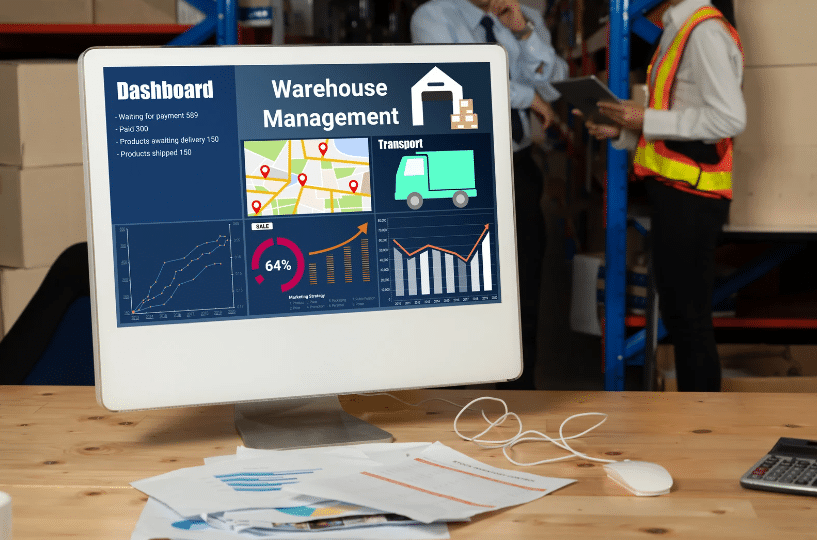
A Warehouse Management System (WMS) is essential for businesses looking to streamline inventory processes and improve warehouse efficiency. A WMS uses software and technology to control and manage day-to-day warehouse operations. From tracking inventory levels and stock locations to managing picking, packing, and shipping, WMS platforms are critical in today’s supply chain management.
A well-designed WMS brings a wide range of features that help businesses optimize warehouse operations. Below are some of the primary functions a WMS performs:
Inventory management is a core feature of any WMS, allowing real-time tracking of inventory levels, stock locations, and stock movements. With these insights, warehouse managers can maintain optimal stock levels, avoiding both overstock and stockouts, which can affect the business’s profitability.
A WMS provides a centralized hub for managing orders, from the moment they are placed until they are shipped. By streamlining order fulfillment and ensuring accurate inventory tracking, a WMS reduces errors and increases customer satisfaction.
A robust WMS improves picking and packing by using technology to create efficient workflows. Advanced WMS platforms often use barcode scanning, RFID, and automated storage and retrieval systems (AS/RS) to speed up picking and packing, reducing manual errors.
WMS platforms often include labor management tools that track productivity, assign tasks, and monitor labor costs. Managers can use these tools to optimize schedules, making sure that labor resources are efficiently used without incurring unnecessary expenses.
A WMS can streamline the shipping process by providing real-time tracking of shipments and optimizing routes. It also simplifies returns by organizing returned items back into the inventory for resale, reducing losses associated with returns.

Different types of WMS solutions are available depending on the size, needs, and complexity of the business. Here’s a closer look at some of the most common types of WMS:
A standalone WMS is a basic system focused solely on managing warehouse operations. It’s suitable for smaller warehouses that need straightforward inventory and order management capabilities without extra features like ERP integration.
Cloud-based WMS platforms are hosted online, allowing remote access and reducing the need for on-site IT infrastructure. They are scalable and updated automatically, making them ideal for growing businesses. Additionally, cloud-based WMS solutions are more cost-effective due to subscription-based pricing models.
An ERP-integrated WMS is part of a broader enterprise resource planning (ERP) system, connecting warehouse operations with other areas of the business, such as sales and finance. This type of WMS is best for larger companies with complex needs that require seamless integration across departments.
Some companies may use WMS functionality that comes as part of a larger supply chain management (SCM) system. These WMS modules integrate warehouse management with other supply chain activities, such as procurement, production, and logistics.
Adopting a WMS provides a wealth of benefits for companies of all sizes, from better inventory control to higher efficiency.
By automating data entry and tracking, a WMS reduces human error, ensuring that stock levels, order statuses, and inventory movements are accurately recorded. This leads to improved customer satisfaction and minimizes costly errors.
WMS platforms often help optimize warehouse layout, ensuring that high-demand items are easily accessible and travel distances within the warehouse are minimized. This optimization reduces picking time and boosts overall productivity.
With streamlined processes and real-time data, a WMS enables faster order picking, packing, and shipping. Faster order fulfillment improves customer satisfaction and enables companies to handle larger order volumes without compromising quality.
A WMS reduces costs by minimizing errors, improving efficiency, and optimizing labor. By keeping track of inventory and streamlining processes, businesses can avoid unnecessary expenses associated with inventory discrepancies and lost time.
As your business grows, a WMS can scale with it, allowing you to manage more inventory, add more locations, and accommodate higher order volumes. Cloud-based WMS solutions are particularly flexible, allowing for easy scaling without significant hardware investments.

Choosing the right WMS depends on your business’s unique requirements. Below are some key features to consider when selecting a WMS:
A flexible WMS that can be customized to fit your specific workflows and needs is crucial. Look for systems that allow customization to suit your unique warehouse setup and operational goals.
The ideal WMS will integrate seamlessly with your other business software, such as ERP systems, accounting software, and eCommerce platforms. This connectivity allows for a smoother flow of data across departments, improving overall operational efficiency.
A user-friendly WMS with intuitive navigation and straightforward functionality is important for reducing training time and improving adoption among employees.
Ensure that the WMS you choose can scale as your business grows. If your warehouse size, order volume, or product variety expands, your WMS should be able to accommodate these changes without requiring a complete overhaul.
A strong support system and comprehensive training options are essential when implementing a new WMS. Good customer support ensures that any issues are quickly resolved, minimizing disruption to your operations.
As technology advances, so does the functionality of warehouse management systems. Below are some trends shaping the future of WMS.
Robots and automated storage and retrieval systems (AS/RS) are transforming the way warehouses operate. With automation, warehouses can handle more volume and improve accuracy, while reducing labor costs.
AI-driven insights and machine learning algorithms allow WMS platforms to analyze historical data and make predictive recommendations. This helps in forecasting demand, optimizing stock levels, and improving warehouse layouts.
IoT-enabled devices can collect real-time data on inventory levels, location, and even environmental conditions. This data, combined with a WMS, provides complete visibility over the warehouse and helps managers make data-driven decisions.
Cloud-based WMS solutions are becoming the norm, as they offer easy access, low upfront costs, and automatic updates. Businesses can quickly scale and adapt to changes in demand without the need for extensive on-site IT resources.

If you’re looking to maximize the benefits of a WMS, Cloudvara offers specialized inventory software hosting services that help streamline warehouse operations. Here’s how Cloudvara can support your WMS needs:
For those seeking a cloud-hosted solution for inventory software, Cloudvara’s Fishbowl Inventory Cloud Hosting and inFlow Hosting provide a secure, scalable, and accessible way to leverage the benefits of a WMS without the overhead of on-site servers. Start optimizing your warehouse operations with Cloudvara’s trusted cloud hosting services and gain a competitive edge in today’s fast-paced market.
Take control of your inventory, streamline your processes, and prepare your business for growth with the right Warehouse Management System. Cloudvara’s cloud hosting services for Fishbowl Inventory and inFlow make it easy to access real-time data, scale operations, and improve overall efficiency—no on-site infrastructure needed.
With Cloudvara by your side, you’ll be equipped to meet today’s demands and tomorrow’s challenges. Contact Cloudvara today and embrace the future of warehousing today!